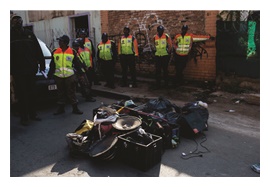By Annalise Kempen
Photos by Vincent Lali, Ashraf Hendricks, Ihsaan Haffejee/GroundUp and City of Cape Town
It is a fact that 607 163 contact crimes have been reported between 1 April 2021 and 31 March 2022 - a fact which should serve as a wake-up call about the crime situation in South Africa. An analysis of these 600 000+ reported contact crimes (crimes against the person), reminds us that an average of 69 people had been murdered each day during that period; 114 people had been raped; 57 vehicles and five trucks had been hijacked; and that 60 house robberies and 446 cases of assault GBH had been reported every single day of those 12 months (SAPS, 2022).
What is more important to remember is that these statistics represent real victims whose cases had been reported to the police, not considering those crimes that had not been reported. And no matter which excuses anyone tries to come up with, these statistics cannot be justified in any way or by anyone. The question is not necessarily about who should take the blame for our shocking crime statistics (in addition to the criminals), but rather about what we are going to do to address the culmination of societal, economic and political factors that contribute to our high crime rates.
Finger-pointing per se will never solve our high crime rates, but there should be no harm in asking whether the devolution (transfer or delegation) of policing powers can make a positive contribution in addressing and lowering crime rates. This has become a relevant question ever since leadership in the Western Cape have been calling for the devolution of policing power to provinces - often in no uncertain terms. In fact, in July 2022, Reagen Allen, the Western Cape Minister (MEC) of Police Oversight and Community Safety, issued a strongly worded statement in which he said the following: "Most of us know the definition of insanity as 'doing the same thing over and over and expecting different results'. Unfortunately, management of the South African Police Service (SAPS), sitting up in Pretoria, has yet to catch on. For years, they have maintained the same outdated, unresponsive, unscientific policing practices. Meanwhile, the world has moved on, and so have our criminals - leaving them behind. For our part, it would be insane to allow this to continue. The only way we'll ever see an impactful SAPS is if changes are made, and these should be drastic and sweeping. Much like he sees tattoos, the national police minister, Bheki Cele, sees 'devolution' as criminal. In fact, it is this level of change that is required to start producing the different results we need from our hamstrung and mismanaged crime-fighting resources" (Allen, 2022).
Is there a legal basis for devolution of policing powers, or not?
In his July 2022 statement, MEC Allen explained that the Western Cape government believed that there is a firm basis for the devolution of policing to the province - especially in areas where they can show to do better. According to Mr Allen, section 99, read with section 206 of the Constitution of the Republic of South Africa, 1996 deals with assigning the relevant provincial ministers such powers and functions contained in the South African Police Service (SAPS) Act 68 of 1995. This should be done to empower the provincial government to have more effective and efficient control over the police within the relevant province.
Section 99 of the Constitution reads as follows:
"A Cabinet member [national minister] may assign any power or function that is to be exercised or performed in terms of an Act of Parliament [SAPS Act] to a member of a provincial Executive Council or to a Municipal Council. An assignment -
(a) Must be in terms of an agreement between the relevant Cabinet member and the Executive Council member or Municipal Council;
(b) must be consistent with the Act of Parliament in terms of which the relevant power or function is exercised or performed; and
(c) takes effect upon proclamation by the Parliament."
******************************
[This is only an extract of an article that is published in Servamus: March 2023. The rest of the article looks at the advantages and prerequisites to the devolution of policing powers; the case of the Western Cape/Cape Town and what would/could happen next. If you are interested in reading more, send an e-mail to: This email address is being protected from spambots. You need JavaScript enabled to view it. or a WhatsApp to: 078 712 1745 to find out what you have to do. Ed.]








